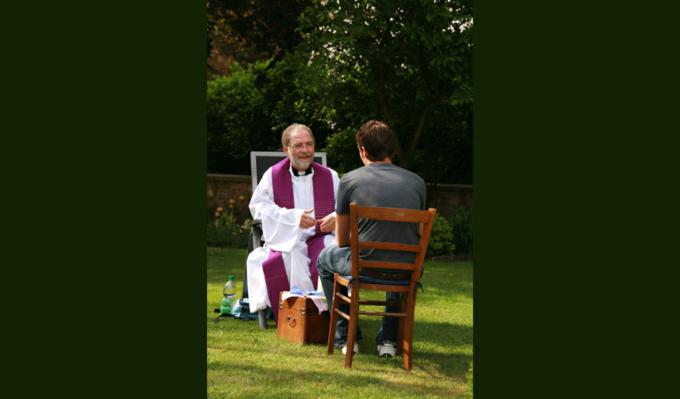
Faith
. . . The church generally envisions the sacrament of confession to be celebrated in a more private setting.

Cooper
Q: Our parish priest has decided to forego the confessional and now stands at the foot of the altar and makes us go to confession to him right out in the open, where anyone can see or walk by. I feel very exposed and don't like it. Is this licit? (Plainview, NY)
A: Confessions heard "out in the open" are not invalid and can be licit in some circumstances. One historic case that comes readily to mind is St. Damien of Malachi who, after he contracted leprosy from the people he served, would shout his confessions to a priest on a boat just off shore, to avoid spreading his highly contagious disease. To give a less extraordinary modern-day example, sometimes children's confessions will be heard out of earshot but in full view of their parents as a way of complying with various "safe environment" policies.
However, the church generally envisions the sacrament of confession to be celebrated in a more private setting. In the current Code of Canon Law, canon 964, 1 tells us that: "The proper place for hearing sacramental confessions is a church or oratory." Canon 964, 3 goes on to specify: "Confessions are not to be heard outside a confessional without a just cause."
In canon law, there is a much lower bar to classify something as a "just cause" than there is for a "grave cause." In colloquial terms, a "just cause" is a reasonable motivation, whereas as a "grave cause" refers to extremely dire circumstances. It could be that your parish priest sees a just cause for having confessions out in the open, so it might be good to have direct but respectful conversation with him about this practice.
That being said, you are not required to make your own confession out in the open. You can always ask your priest to hear your confession in a more discreet place. And you are always free to seek the sacrament of reconciliation at another parish that makes more regular use out of the confessionals, or perhaps at a local shrine or other Catholic place of prayer where confessions are heard.
Q: We wear white for baptism, and first communions and we get married in white. Are we supposed to always wear white for all of the sacraments? Does it really matter what we wear? (Daytona, FL)
A: No, white clothing is not strictly required for any sacrament, although in many cases wearing white can be a beautiful and fitting custom.
The only time white clothing is necessary in the context of a sacrament is during the rite of baptism itself, when the newly-baptized is presented with a symbolic white garment with the words: "You have become a new creation and have clothed yourself in Christ. Receive this baptismal garment and bring it unstained to the judgment seat of our Lord Jesus Christ, so that you may have everlasting life." (But even here, it's worth noting that the ritual itself allows for this part to be omitted from the baptismal celebration "if circumstances suggest.")
Although it's not mandatory in the church's law, wearing white for other major sacramental occasions is still a very appropriate practice, since it helps us recall our first and foundational sacrament of baptism. Incidentally, even the white cloth -- called a "pall"-- that is draped over the casket at a Catholic funeral is meant as a reminder of the hope for eternal life that baptism gives us.
Additionally, in our Latin Catholic tradition, white is a liturgical color signifying joy. For instance, think of how the priest wears white vestments during the joyful seasons of Christmas and Easter. And white clothes are a scriptural allusion to Revelation 7:14, which described the redeemed souls in heaven as having: "washed their robes and made them white in the blood of the Lamb."
- Canonist Jenna Marie Cooper is a consecrated virgin, a practicing canon lawyer, and columnist for OSV News.
Recent articles in the Faith & Family section
-
Scripture Reflection for April 21, 2024, Fourth Sunday of EasterJem Sullivan
-
The new Temple: How Easter changes religionDr. R. Jared Staudt
-
The wonder of Ordinary TimeLucia A. Silecchia
-
Is there still responsibility for past sins after confession?Jenna Marie Cooper
-
Wounds, not scarsJaymie Stuart Wolfe


















